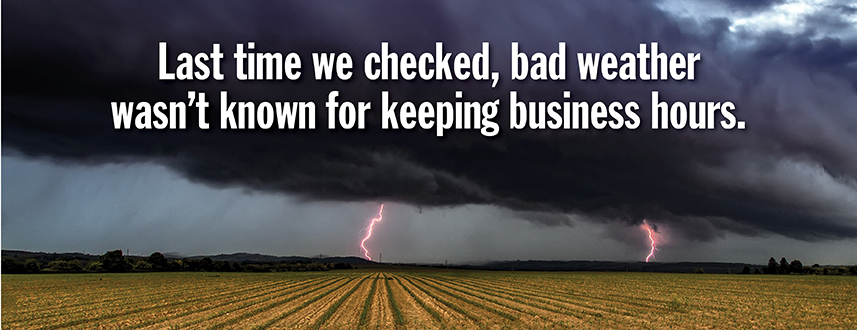Storm Preparedness
 Living in the Bluegrass State, we know that severe weather can arrive in many different forms – wind, thunderstorms, tornadoes, flooding, snow, ice, extreme cold – but how it impacts your home, car or business doesn’t always have to be a surprise.
Living in the Bluegrass State, we know that severe weather can arrive in many different forms – wind, thunderstorms, tornadoes, flooding, snow, ice, extreme cold – but how it impacts your home, car or business doesn’t always have to be a surprise.
Have you experienced a property loss? Click here for information on what to do next.
Consider these quick tips to help keep you, your family and your property safe the next time severe weather happens:
Before the storm
Before the storm
- Awareness
The highest risk of severe thunderstorms and tornadoes in Kentucky typically occurs in March through June, but, when the weather conditions are right, we’ve all seen that they can happen any time of the year. Listen daily to your local weather forecast and be aware of threatening or potentially severe weather situations. Remember to place your safety and the safety of your family above all else in any severe weather situation.
Want more tips? Read this extended list of tips about severe weather safety on Life's Blueprints, a blog by KFB Insurance.
- Identify Your Property
Unfortunately, some storms can cause a catastrophic loss of property. In those cases it is very helpful to have an itemized list of your property on file to speed up your recovery process. If you don’t already have a list like this started, print out this Personal Inventory Form and begin cataloging your items today!
- Protect Your Property
There’s no foolproof way to protect your property when severe weather is in the forecast, but there are a few preventative measures you can take around your home or business to help minimize the potential for damage. The next time a storm warning arises, be sure to:
- Move lawn furniture inside and secure other outdoor items such as grills, trampolines and portable basketball goals. These can become wind-driven projectiles during severe thunderstorms or tornadoes.
- Secure windows and doors throughout your house or business, and make sure you know where the safest part of the building is in the event of a tornado.
-Move vehicles inside a garage or carport to protect them from hail damage.
- Want more tips?
Follow this link for additional weather safety information from the National Weather Service.
After the storm
After the storm
Severe weather events can continue to be dangerous even after the storms have passed. Make sure that you and your family are safe and secure before venturing out to assess the damage! After a storm hits, the National Weather Service recommends the following:
- Continue listening to local news or a NOAA Weather Radio.
- If you are away from home, return only when authorities say it is safe to do so. Listen to the radio, TV or other trusted media for updates.
- Tornado debris may include sharp or dangerous objects. When walking through a tornado-stricken site, wear long pants, a long-sleeved shirt and sturdy shoes.
- Watch out for fallen power lines or broken gas lines. Report downed lines immediately to your local power company.
- Stay out of damaged buildings.
- Use battery-powered flashlights when examining buildings. Do NOT use candles which could start a fire.
- If you smell gas or hear a blowing or hissing noise, open a window and get everyone out of the building quickly. Once everyone is out, immediately call the gas company or fire department.
- Carbon monoxide poisoning is one of the leading causes of death after storms when areas are dealing with power outages. Never use a portable generator inside your home or garage. For additional generator operating tips, read this brief guide for generator safety from the Center for Disease Control and Prevention.
- Use the telephone only for emergency calls so rescue operation lines aren't tied up.
- Check for injuries. If you are trained, provide first aid to victims in need until emergency responders arrive.
- Once the danger is over and your family is safe and secure, please contact us to report a claim if you have storm damage.